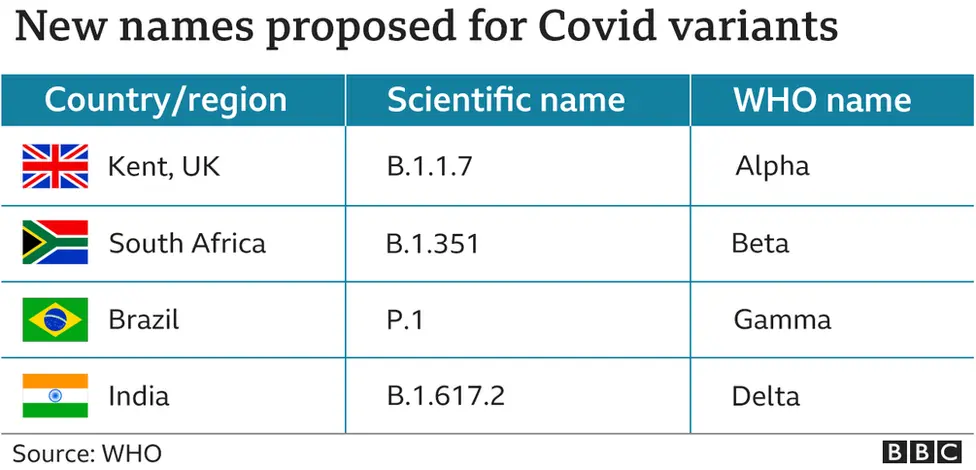Covid-19: Europe braces for surge in Delta variant
 Getty Images
Getty ImagesGerman Chancellor Angela Merkel has warned that Europe is "on thin ice" as the Delta variant of Covid spreads on the continent.
Her warning came as EU health officials said the variant would account for 90% of the bloc's cases by late August.
The spread could disrupt plans for lifting restrictions during the summer.
The Alpha variant, first discovered in the UK, hit Europe hard early this year and Delta, now dominant in the UK, is thought 40%-60% more transmissible.
Andrea Ammon, the director of the European Centre for Disease Prevention and Control (ECDC), said on Wednesday that the spread of the Delta variant showed the importance of speeding up vaccinations in Europe, as "preliminary data shows that it can also infect individuals that have received only one dose of the currently available vaccines".
Two doses offered "high protection" against the Delta (B.1.617.2) variant, she added.
Delta, first identified in India, now accounts for almost all new infections in the UK.
On Wednesday Mrs Merkel called for a more co-ordinated EU response and said all member states should quarantine arrivals from the UK considering the dangers of the spread of Delta.
The UK is not on the EU's list of safe countries, due to the spread of Delta, but that list is not binding on member states.
UK Prime Minister Boris Johnson has said that while fully vaccinating people offered "a good way forward" for resuming travel, this summer would not be "like every other. This is going to be a more difficult summer to take a holiday".
Here is how different parts of Europe are dealing with the threat of Delta.
France
Although cases in France have been falling, Delta is causing concern in an area in the south-west of the country.
On Thursday, Prime Minister Jean Castex and the country's health minister visited Les Landes, where the variant accounts for 70% of infections. Across France, it is believed to be behind 10% of cases.
Mr Castex described the situation in Les Landes as "difficult but not catastrophic", before stressing the importance of testing and vaccinations.
He said 20 million people in France - or around 30% of the population -had been fully vaccinated, but argued that the number was still not high enough. "Be afraid of the virus, don't be afraid of the vaccine," he said.
President Emmanuel Macron also spoke of his concern at the spread of the variant.
"We should all be vigilant because the Delta variant is coming," he said on Thursday. "We see that it affects people who have not yet been vaccinated or who have only had one dose, which means we have to be even faster in this vaccination campaign."
Although most lockdown rules have been lifted in France, a resurgence in cases could lead to a return of restrictions.

Russia
On Thursday, Russia recorded more than 20,000 new cases and 569 deaths - the highest figures since January.
In the capital Moscow - which has seen its highest number of daily deaths since the pandemic began - the Delta variant is responsible for 90% of new infections, according to the city's mayor.
The spread of the variant has been complicated by low vaccination uptake across the country.
Although Russia was one of the first countries to develop a vaccine, only 12.8% of Russians had received a single dose and 9.9% were fully vaccinated by 16 June.
 EPA
EPAPortugal
Portugal has announced new restrictions for the Lisbon region and two other areas due to rising case numbers.
Cabinet Minister Mariana Vieira da Silva said on Thursday that the new rules were "an attempt to contain" the Delta variant, which now accounts for more the half of new cases in the capital and the Tagus Valley.
The rules include a weekend travel ban for the Lisbon area, with residents only allowed to leave for essential journeys. Plans to ease restrictions elsewhere in the country have also been dropped.
Earlier this week, the country's health minister admitted the country could have "acted differently" to prevent the spread of the variant. Her comments came after Angela Merkel said the situation in Portugal could have been avoided with EU-wide travel rules. Portugal had allowed travellers from the UK to enter with a negative test.
Separately, the head of Portugal's vaccination programme has said the country may miss its target of providing at least a first dose to 70% of the population by early August if shortages continue.
Euro 2020
The German head of the World Medical Association has urged people not to travel to London for Euro 2020 matches over concerns about the Delta variant.
Ahead of Germany's match against England in London next Tuesday, Frank Ulrich Montgomery said that those travelling to the UK "run the risk of getting infected with the Delta variant".
"I consider it irresponsible for even vaccinated people to travel to London in this situation," he told Germany's RND news network.
The stadium at Wembley will allow 60,000 fans to watch the tournament's semi-finals and final. It means the stadium will be at 75% capacity for those games.
Health officials in Denmark, meanwhile, have asked 4,000 fans to get tested after three people who attended last Thursday's Denmark v Belgium match contracted the Delta variant.
All three are thought to have been infected at the game.
